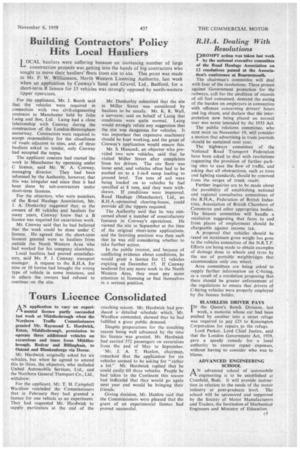Building Contractors' Policy Hits Local Hauliers
Page 43

If you've noticed an error in this article please click here to report it so we can fix it.
LOCAL hauliers were suffering because an increasing number of large LOCAL projects was getting into the hands of big contractors who sought to move their. hauliers' fleets from site to site. This point was made to Mr. F. W. Williamson, North Western Licensing Authority, last week when an application by Conway's Sand and Gravel, Ltd., Bedford, for a short-term B licence for 15 vehicles was strongly opposed by north-western tipper operators.
For the applicants, Mr. J. Booth said that the vehicles were required in connection with two civil-engineering contracts in Manchester held. by John Laing and Son, Ltd. Laing had a close 'relationship with Conway during the construction of the London-Birmingham motorway. Contractors were required to accept responsibility for the cleanliness of roads adjacent to sites, and, of three hauliers asked to tender, only Conway had accepted the terms. The applicant concern had started the work in Manchester by operating under C licence, said Mr. W. A. Conway, managing director. They had been informed by the Authority, however, that this was irregular and since then it had been done by sub-contractors under short-term licences.
For the objectors, who were members of the Road Haulage Association, Mr. J. A. Dunkerley suggested that, as the owners of 40 vehicles and hauliers for many years, Conway knew that a B licence was required for excavation work.
Mr. Conway said that he had believed that the work could be done under C licence. He agreed that the short-term licences granted were to hauliers from outside the North Western Area who had worked for his company elsewhere.
Local hauliers had proved unsatisfactory, said Mr. P. J. Conway, transport manager. A request to the R.H.A. for nine or 10 lorries had brought the wrong type of vehicle in some instances, and in others the owners had refused to continue on the site. Mr. Dunkerley submitted that the site in Miller Street was considered by hauliers to be unsafe. Mr. K. R. Wall, a surveyor, said on behalf of Laing that conditions were quite normal. Laing would strongly refute any suggestion that the site was dangerous for vehicles. It was important that expensive machinery should be kept working, and the grant of Conway's application would ensure this.
Mr. S. Hancock, an objector who provided two new vehicles, said that he visited Miller Street after complaints from his drivers. The site floor was loose sand, and vehicles often had to be pushed on to a I-in-8 ramp leading to ground level. Ten tons of soil were being loaded on to vehicles he had specified at 8 tons, and they were withdrawn. If conditions were improved, Road Haulage (Manchester), Ltd., an R.H.A.-sponsored clearing-house, could provide all the tippers required.
The Authority said that he was concerned about a number of unsatisfactory features in Conway's operations. He viewed the site in September at the time of the original short-term applications, and the licensing position was then such that he was still considering whether to take further action.
In the public interest, and beeause of conflicting evidence about conditions, he would grant a licence for 12 vehicles expiring on December 15. If Conway tendered for any more work in the North Western Area, they must pay more attention to licensing or find themselves in a serious position.












































































































